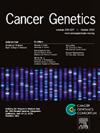乳腺癌和其他非乳腺癌患者的遗传检测转诊和种系致病变异
IF 2.1
4区 医学
Q4 GENETICS & HEREDITY
引用次数: 0
摘要
背景:指南建议对原发癌症和诊断年龄的特定组合进行种系基因检测,但不建议对所有多发性原发癌症(MPC)患者进行检测。乳腺癌患者更有可能接受基因检测。在这里,我们评估了首次乳腺癌是否比其他类型的首次癌症更有可能促使检查转诊。方法使用乳腺癌医疗记录研究数据库Oncoshare和加州癌症登记处,我们将2000年1月至2023年6月诊断为乳腺癌的MPC女性患者确定为第一或第二癌症,并在斯坦福医疗中心就诊。我们分析了第一次和第二次癌症诊断后的基因检测率和致病变异(PV)的产量。我们评估了接受基因检测与乳腺癌发病时间(第一次或第二次)之间的关系,采用单变量和多变量logistic回归,调整了首次诊断时的年龄、种族/民族以及首次和第二次诊断之间的时间。结果1069例患者符合入选标准;75%是非西班牙裔白人,73%的人乳腺癌是第一种癌症。342例(32%)患者接受了检测,其中113例(33%)至少有一种PV。首次乳腺癌患者有较高的检测率趋势(OR 1.62, 95% CI 0.9 ~ 3.0), p = 0.11。结论使用乳腺癌研究数据库,当乳腺癌先于另一种癌症时,MPC患者更有可能接受基因检测。种系致病变异的高产量表明,所有MPC患者都应进行癌症遗传学风险评估。本文章由计算机程序翻译,如有差异,请以英文原文为准。
Genetic testing referral and germline pathogenic variants in patients with breast cancer and another non-breast cancer
Background
Guidelines recommend germline genetic testing for specific combinations of primary cancers and ages of diagnoses, but do not recommend testing for all patients with multiple primary cancers (MPC). Patients with breast cancer are more likely to receive genetic testing. Here, we evaluated whether a first breast cancer was more likely than another first cancer type to prompt testing referral.
Methods
Using Oncoshare, a breast cancer research database of medical records and the California Cancer Registry, we identified female patients with MPC diagnosed January 2000-June 2023 with breast cancer as either the first or second cancer and seen at Stanford Health Care. We analyzed genetic testing rates after first versus second cancer diagnosis and the yield of pathogenic variants (PV). We evaluated the association between the receipt of genetic testing and timing of breast cancer (1st or 2nd), using univariate and multivariable logistic regression adjusted for age at first diagnosis, race/ethnicity, and time between first and second diagnoses.
Results
1,069 patients met eligibility criteria; 75 % were non-Hispanic white, and 73 % had breast as the first cancer. 342 (32 %) patients had testing, of which 113 (33 %) had at least one PV. Patients with first breast cancer had a trend toward higher testing rate, (OR 1.62, 95 % CI 0.9–3.0), p = 0.11.
Conclusion
Using a breast cancer research database, MPC patients showed a trend toward being more likely to receive genetic testing when breast cancer preceded another cancer. High yield for a germline pathogenic variant suggests that all MPC patients should have cancer genetics risk assessment.
求助全文
通过发布文献求助,成功后即可免费获取论文全文。
去求助
来源期刊

Cancer Genetics
ONCOLOGY-GENETICS & HEREDITY
CiteScore
3.20
自引率
5.30%
发文量
167
审稿时长
27 days
期刊介绍:
The aim of Cancer Genetics is to publish high quality scientific papers on the cellular, genetic and molecular aspects of cancer, including cancer predisposition and clinical diagnostic applications. Specific areas of interest include descriptions of new chromosomal, molecular or epigenetic alterations in benign and malignant diseases; novel laboratory approaches for identification and characterization of chromosomal rearrangements or genomic alterations in cancer cells; correlation of genetic changes with pathology and clinical presentation; and the molecular genetics of cancer predisposition. To reach a basic science and clinical multidisciplinary audience, we welcome original full-length articles, reviews, meeting summaries, brief reports, and letters to the editor.
 求助内容:
求助内容: 应助结果提醒方式:
应助结果提醒方式:


